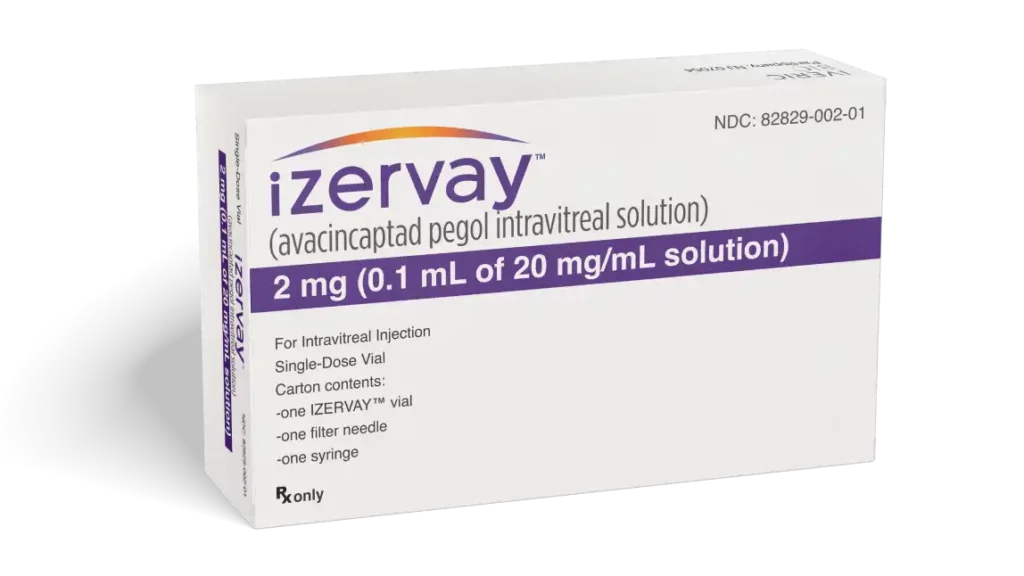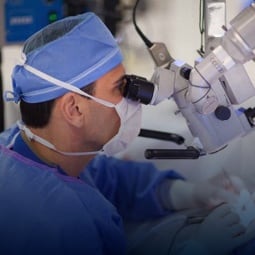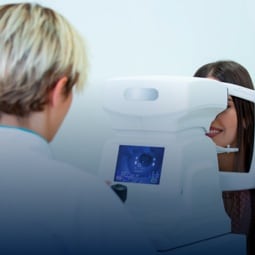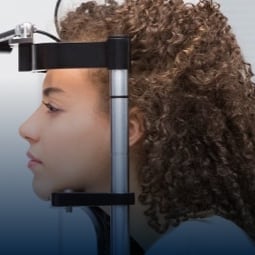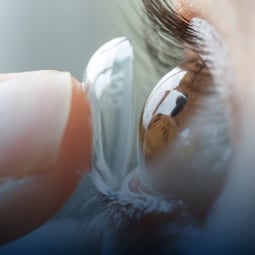
Your Retina Is Essential for Vision
The retina is crucial for helping you see, converting light into neural signals for visual recognition. However, certain conditions can damage your retina and macula, affecting your vision. Without proper intervention, these conditions can worsen your eyesight and lower your quality of life.
At Center For Sight, we can help care for your retina and vision. Our vitreoretinal specialists can diagnose any problems and provide treatment options to help preserve your vision.
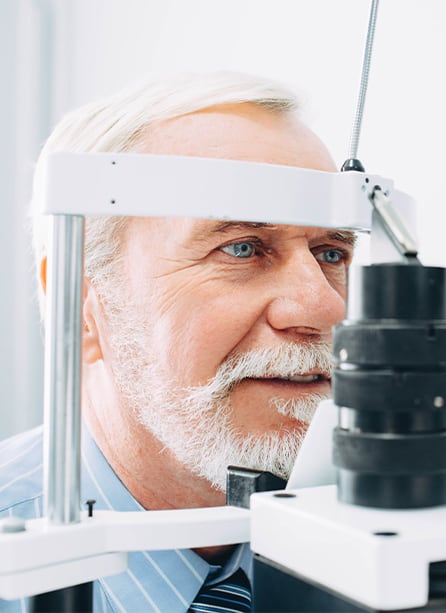

Macular Degeneration Can Permanently Damage Your Vision
Age-related macular degeneration (AMD) is a common condition that affects your central vision. It occurs when the macula begins to thin with age. While AMD does not cause blindness, it can affect your vision and impact your ability to drive, read, and recognize faces.
There are 2 types of AMD:
- Dry AMD: The most common form of this condition, dry AMD causes the tissue in the macula to thin and lose the cells needed for vision.
- Wet AMD: Wet AMD is less common but more severe, occurring when abnormal blood vessels leak fluid and blood into the macula. Wet AMD is a medical emergency requiring care as soon as possible.

Common Retinal Issues
Besides AMD, other conditions can affect the retina. Many can significantly affect your vision if they’re left untreated. Our experienced doctors can offer recommendations for treatment after conducting a comprehensive eye exam.
Diabetic Retinopathy
Diabetic retinopathy occurs when diabetes damages the blood vessels, leading to blurry, distorted vision and potential blindness. This disease has 2 stages: nonproliferative and proliferative.
As blood vessels in the retina become damaged, they can close off. New, abnormal blood vessels grow, known as neovascularization. These weak blood vessels can bleed into the retina and may develop scar tissue.
Diabetic retinopathy can cause blurry, darkened, or cloudy vision. Laser photocoagulation, vitrectomy, and cryotherapy are potential treatments for this condition.
Learn more about how GA can appear.
Macular Pucker
A macula pucker is an eye condition where your vision becomes wavy or distorted. It occurs when wrinkles, creases, or bulges form in the macula. As the vitreous pulls away from the macula, scar tissue may develop.
The warping and contracting of this scar tissue can cause the retina to wrinkle and bulge. Vitrectomy surgery can help remove scar tissue if you experience significant vision loss.
Macula Hole
A macula hole is a small break in the macula, causing blurred and distorted vision. This condition occurs when the shrinking vitreous adheres to the macula. The macula tissue then stretches and tears after several weeks or months.
Macula holes progressively worsen your vision at distant and close range. Vitrectomy surgery is the most effective treatment to repair a macular hole.
Posterior Vitreous Detachment (PVD)
Posterior vitreous detachment (PVD) is a condition that occurs with age. The vitreous can change with time, becoming more liquid-like. It shrinks and pulls away from the back of the eye.
PVDs typically do not cause significant problems, but there is the chance for a retinal tear or detachment if this condition is left untreated. Symptoms of this condition include:
- Flashes of light
- New floaters
- A shadow in your peripheral vision
- A gray curtain moving across your visual field
Retinal Care
The retina is the delicate, light-sensitive tissue that covers the interior wall of the eye. It is essential for helping you see images, and damage to the retina can significantly impact your vision.
If you’re experiencing vitreoretinal problems, one of our retina specialists can help. Our state-of-the-art technology helps the Center For Sight team diagnose vitreoretinal problems and offer treatment recommendations, such as scleral buckling.
IZERVAY for Geographic Atrophy
IZERVAY (avacincaptad pegol intravitreal solution) is a prescription eye injection, used to treat geographic atrophy (GA), the advanced form of dry age-related macular degeneration (AMD). IZERVAY slows GA progression by directly targeting a key source of retinal cell death and loss of photoreceptors.
Living with GA may present challenges, especially with changing vision. IZERVAY is a new medicine proven to slow the progression of GA. Slowing GA progression may help preserve vision longer. We want to extend our support as you begin your treatment journey with IZERVAY and encourage you to stay vigilant about your vision, surround yourself with a support network, and partner with your doctor to stay one step ahead of GA.
Treatment with IZERVAY is just the beginning.
Contact Our Retina Specialist for Comprehensive Retina Condition Care
Problems affecting the retina and macula can permanently damage your vision, but early diagnosis and treatment can help protect your sight. Our Center For Sight specialists can help diagnose and treat these conditions. Contact us and find out how we can help preserve your vision.

Our Locations

News
How Omega-3 Fatty Acids Can Support Eye Health in Managing AMD
Eye Care, GlaucomaReviewed By: Dr. Tanuj Banker. Age-related macular degeneration (AMD) is a leading cause of vision loss, particularly among older adults. While there’s no cure, research suggests that certain nutrients—especially omega-3 fatty acids—may help slow its progression and support long-term eye health. Understanding the link between omega-3 and AMD could be key to preserving vision. Here’s how […]
Read More… from How Omega-3 Fatty Acids Can Support Eye Health in Managing AMD
How Genetic and Lifestyle Factors Influence Your Risk for Glaucoma
Eye Care, GlaucomaReviewed By: Dr. Joshua W. Kim, M.D. Glaucoma is often called the “silent thief of sight” because it can slowly damage vision without showing any obvious symptoms. Since January is Glaucoma Awareness Month, it’s a time to focus on understanding this serious condition and how we can protect our vision. As glaucoma is a leading cause […]
Read More… from How Genetic and Lifestyle Factors Influence Your Risk for Glaucoma
Top 5 Most Common Symptoms of Dry Eye
Eye CareReviewed By: Dr. Priya Mathews, MD Dry eye isn’t just about mild irritation; it’s a condition that can affect your quality of life. Understanding the symptoms is crucial if you’ve noticed discomfort in your eyes lately. With millions of people experiencing dry eye every year, recognizing its early signs can make all the difference in seeking […]
How Omega-3 Fatty Acids Can Support Eye Health in Managing AMD

Reviewed By: Dr. Tanuj Banker. Age-related macular degeneration (AMD) is a leading cause of vision loss, particularly among older adults. While there’s no cure, research suggests that certain nutrients—especially omega-3 fatty acids—may help slow its progression and support long-term eye health. Understanding the link between omega-3 and AMD could be key to preserving vision. Here’s how […]
Read More… from How Omega-3 Fatty Acids Can Support Eye Health in Managing AMD
How Genetic and Lifestyle Factors Influence Your Risk for Glaucoma

Reviewed By: Dr. Joshua W. Kim, M.D. Glaucoma is often called the “silent thief of sight” because it can slowly damage vision without showing any obvious symptoms. Since January is Glaucoma Awareness Month, it’s a time to focus on understanding this serious condition and how we can protect our vision. As glaucoma is a leading cause […]
Read More… from How Genetic and Lifestyle Factors Influence Your Risk for Glaucoma
Top 5 Most Common Symptoms of Dry Eye

Reviewed By: Dr. Priya Mathews, MD Dry eye isn’t just about mild irritation; it’s a condition that can affect your quality of life. Understanding the symptoms is crucial if you’ve noticed discomfort in your eyes lately. With millions of people experiencing dry eye every year, recognizing its early signs can make all the difference in seeking […]
Check Us Out On Social.


We are a proud partner of US Eye, a leading group of patient-centric, vertically integrated multi-specialty physician practices providing patients with care in ophthalmology, optometry, dermatology and cosmetic facial surgery.


